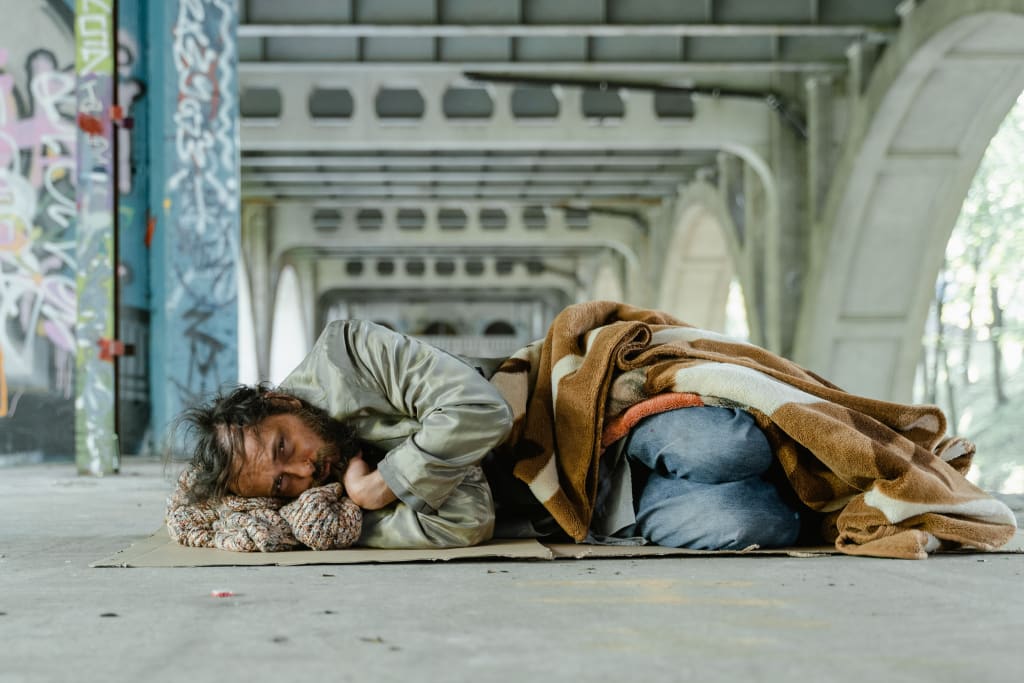
It was a night like every other night for Henry. The bitter winter winds rattled the window panes in his room and the plastic garbage bags he had over them to block the sun and insulate out the cold flapped as they filled with air. The moaning sound of the wind outside was accompanied by the sounds of an ambulance siren in the distance. Henry lay in his bed wrapped in layers of blankets shivering. Morning will come soon he thought to himself as he tried to fall asleep.
The next morning Henry awoke and his stomach was growling. He hadn’t had anything to eat since around lunch the day before when his supervisor brought some fast food to his job site. It’s time to have some breakfast he thought to himself and he stuck his feet from the bed down onto the floor.
The cold chill of the draft across the floor reminded Henry of just how cold it was in his room. His toes curled as they touched the tile covered concrete floor. Henry darted for a box where he kept some of his clothing and pulled out an extra pair of socks and immediately put them on. With one of the blankets still wrapped around him he started his way into the hallway and down to the kitchen.
Henry knew there wouldn’t be much to choose from as far as breakfast was concerned but his stomach was growling like the ferocious dogs in the night in his home country of the Dominican Republic. This thought actually provided him some comfort, making him think how much better off he was freezing in Chicago than worrying about the dangers he had escaped in his home country.
In 2015 approximately 43.1 million people lived below the poverty line in the United States (Berger et al, 2018). 200 years ago, the view on poverty may have been that it is a necessity for advancing the economy and that the poor were guaranteed to work if they were avoiding hunger (Ravallion, 2016). Although the social elites understood there was a need for social protection, in times without crisis they often did not support the principal (Ravallion, 2016).
In the kitchen Henry opened his fridge, the dim yellow light lit up three virtually empty wire shelves. On the door he had a bottle of mustard and some hot sauce. There was a jar of pickles he had received as a gift from one of the ladies at his church when she was pickling in the autumn season. He had a container of expired milk and the bottom shelf of the fridge had a couple reused margarine containers with food left over from a pot-luck he attended the weekend before last. Maybe those were still edible.
Henry placed the containers on the counter as his stomach continued to gurgle and gargle, now starting to cause him pains. He opened his cupboard and inside was a small box of tea bags. He took one out and placed it in a mug next to the containers of food. He pulled out two pans, his only two pans, from a lower cupboard next to the stove. In one he put some tap water and set it to boil. The heat from the burner felt so nice in his cold apartment. The second pan he placed on the counter and he began to investigate the leftover food.
In modern society the view on poverty has changed and it is viewed as a social ill and not a necessity which can be avoided if the public takes action, having a positive effect on the economy (Ravallion, 2016). Raising minimum wage to match the indexed inflation rate would provide a significant increase in earnings helping to reduce those that are living in poverty but holding jobs (Vallas & Boteach, 2014). The difference is almost three dollars per hour which would be a significant income boost to those living below the poverty line (Vallas & Boteach, 2014).
In the first container Henry found some ham that was soaking in mustard along with some scalloped potatoes. The ham he knew would be fine because it was cured in salt and soaked in mustard, both methods were a way to extend the preservation of food in his home. The potatoes on the other hand didn’t look to healthy. They were cooked in a creamy sauce and it smelled like it started to ferment. Henry pulled the ham from the container and washed it under cold water in the sink. He inspected it visually and gave it a smell. The ham seemed ok to him so he placed it in the pan on the counter.
In the second container he found something, what that something is one can’t really say. It was at the point where the mold had overtaken whatever food was in the container and it began to decompose at a rapid rate. The smell made Henry think it had possibly been deviled eggs or something of the sort but at this point there was no way to say for sure. As his water boiled on the stove Henry discarded the two containers and made himself a hot tea.
Henry placed the pan with the ham on the hot stovetop burner where the water had been boiling. It almost instantly began to sizzle and pop. As Henry sipped his tea his stomach continued to make obnoxious noises and he was starting to feel nauseous from hunger. The smell of the ham filled the air and it was almost unbearable for Henry to deal with, he was just so hungry but he knew the meat needed to cook.
After the ham was fried up Henry gobbled it back with some of the pickles he had in his fridge. It wasn’t the most filling meal for breakfast but it was something. He looked at the time and realized he needed to hurry. He had to catch his bus for work in 45 minutes and his supervisor was not one for tardiness.
Hourly jobs with low wages often have unpredictable schedules that are constantly shifting. This makes finding balance difficult for the people who work these jobs while trying to juggle work and personal lives (Vallas & Boteach, 2014). The implementation of the “Schedules That Work Act” will make it mandatory that an employee receive their schedule two weeks in advance giving them time to prepare for changes in scheduling and request and schedule changes they may require (Vallas & Boteach, 2014). The employees would also receive protection from employer retaliation for making these requests as well as guarantee the employee is paid for cancelled or shortened shifts (Vallas & Boteach, 2014).
Henry gobbled up his small meal and headed for the bathroom. He hopped in the shower with his toothbrush and began his morning routine. The first five minutes of his shower was the highlight of his day in winter as that was when the water was actually hot and he felt warm.
After finishing his morning routine and he was dressed, Henry headed out to catch his bus. The winter wind was cold but not as cold as the slush mixture on the ground against his feet as it seeped through his running shoes. He kept his arms tight to his body and moved as quickly as he could to the bus stop. If he got there fast enough, he could be in the front of the line to board and there was a higher possibility for him to sit next to a heat register and somewhat dry out his feet. Henry quickly hopped his way through some knee-high snow and across a busy street to the shelter. He was in luck; he was one of the first ones there.
After an hour ride on a warm and crowded bus Henry arrived at work. His stomach now was making a different kind of noise and his nausea this time was not hunger induced. Henry rushed inside to one of the employee washrooms where he began to vomit. The ham Henry decided to eat that morning must have spoiled. The pain in his abdomen was intense. He felt waves of hot and cold rush over him. He needed to pull himself together, going home sick would mean he would lose one day worth of pay and his rent was due when he got his next cheque.
Henry cleaned himself up and started to head out onto the shop floor to get his assignment. After he took a few steps from the washroom his stomach gurgled again. This time he had a different kind of feeling, it wasn’t nausea it was more of a sharp pain. Doubled over Henry darted back to the washroom and was stuck there for a good twenty minutes. Again, he cleaned himself up thinking he must not appear sick or he will be sent home. He left the washroom and went out onto the shop floor. As he took his assignment Henrys stomach continued to churn and gurgle. He thought to himself, today is not going to be an easy day.
Approximately four in ten private-sector workers and seven in ten minimum or low-income workers do not get any paid sick days from their employers in the United States. This puts the workers in a position of having to give up needed income or lose their job in the event that they need to take a personal or sick day (Vallas & Boteach, 2014). Implementing a standard of paid sick and family leave nation wide would significantly reduce this problem and in theory also reduce the risk of spreading illness and causing safety hazards by stopping workers from performing their duties while ill.
Sources
Berger, Lawrence M. et al. “Anti-Poverty Policy Innovations: New Proposals for Addressing
Poverty in the United States.” RSF: The Russell Sage Foundation Journal of the Social Sciences, vol. 4, no. 3, Russell Sage Foundation, 2018, pp. 1–19, https://doi.org/10.7758/rsf.2018.4.3.01.
Ravallion, Martin. “Poverty: The Past, Present and Future.” World Economic Forum, 4 Feb. 2020, www.weforum.org/agenda/2016/01/poverty-the-past-present-and-future.
Vallas, Rebecca, and Melissa Boteach. “The Top 10 Solutions to Cut Poverty and Grow the Middle Class.” Center for American Progress, 17 Sept. 2014, www.americanprogress.org/article/the-top-10-solutions-to-cut-poverty-and-grow-the-middle-class.
Cover Image
Production, M. (2021, May 26). Man in green jacket lying on floor · Free Stock photo. Pexels. https://www.pexels.com/photo/man-in-green-jacket-lying-on-floor-8078366/






Comments (1)
It is a reality